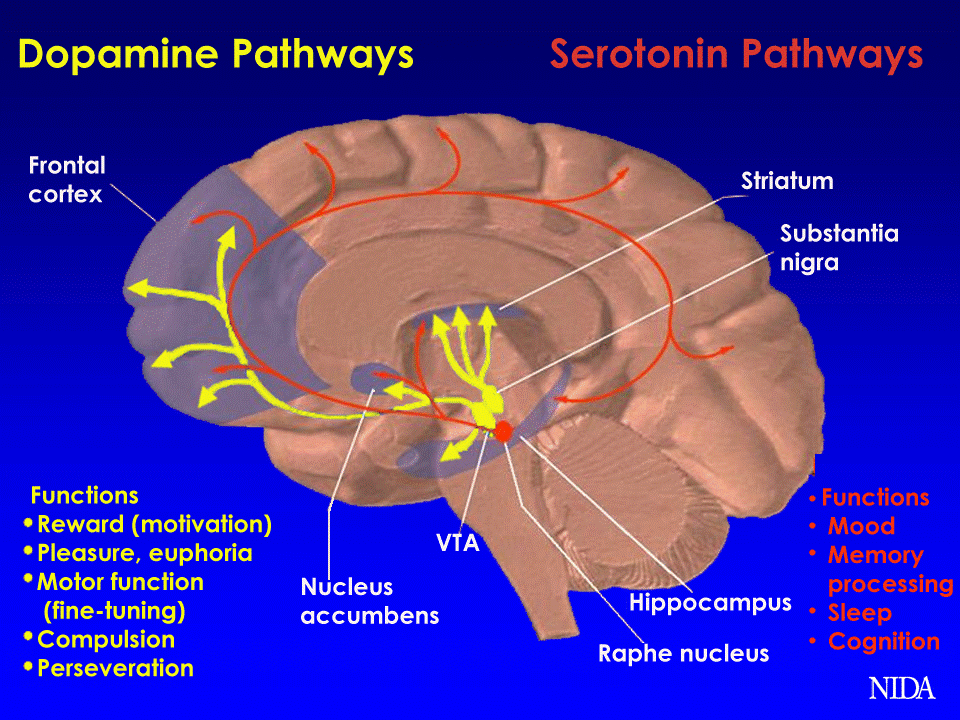The Addicted Brain
The addicted brain-How Drugs Affect the whole system

Your brain is all you need to be of sound mind protecting it from drug addiction is a step in the right direction
Generally drug addiction and all kind of addiction for that matter have been consistent problems for a long time. It is so because of its lasting effect in the brain functions which are not easy to correct. Take for example in the US where the scourge is prevalent how many brains are addicted to drugs, statistics has it that about 2 million are heroin and cocaine addicts, 15 million alcoholics and several millions are cigarette smokers. Several decades ago this was a disaster because little was known about addiction but today a lot has been established and that knowledge is beginning to influence addiction treatment and prevention. This therefore brings us to the question why opium?
The addicted brain-Why does the brain prefer opium to broccoli
This is very interesting and the answer involves the nucleus accumbens a group of nerve cells located under the cerebral hemispheres. When one execute an action which satisfactorily fulfills ones desire the neurotransmitter dopamine is released into the nucleus accumbens and produces pleasure. This communicates that the action facilitates survival or reproduction, directly or indirectly. This system is refferd to us the reward pathway. Undertaking an activity which provides this reward enables the brain to register the experience and we are likely to repeat the same thing again. The damage to the nucleus accumbens and drugs that block dopamine release in the region make everything less rewarding. Naturally rewards usually come only with an effort and after some interruptions and addictive drugs normally provide a shortcut each in its own way sets in motion a biological process which result in flooding the nucleus accumbens with dopamine. The pleasure is not helping the existence or reproduction and evolution has not provided our brains with an easy way to withstand the onslaught. If one becomes addicted through consistent use of a given drug, then the overwhelmed receptor cells will call for a shutdown reducing the natural capacity to produce dopamine in the reward system. This will make the brain to lose its access to other less immediate powerful sources of rewards. This may require the addicts to constantly use higher doses and quicker passage into the brain. This is seen as though the machinery of motivation is not functioning anymore and so they want to use the drug even when it has ceased giving pleasure to them.
The addicted brain-Compelling memories
The change in the reward system alone does not necessarily denote the persistence of addiction as many addiction victims may admit that stopping may be easy because they have probably done it often. They (the addicts) go through long periods without taking the drug, but they risk relapse even after years of abstinence, when the dopamine reward circuit has had plenty of time to recuperate. They are victims of conditioned learning, which creates habitual responses. Drug-induced changes in the links between brain cells establish associations between the drug experience and the circumstances in which it occurred. These implied memories can be recovered when addicts are subjected to any reminder of those circumstances like moods, situations, people, places, or the substance itself. For example heroin addict may be in danger of relapse when they see a hypodermic needle, an alcoholic when they walk pass a bar where they used to drink or when they meet a former drinking companion. Most addicts may restart the habit on falling into a mood in which they used to turn to the drug. It must be noted that a single small dose of the drug itself can be one of the most powerful reminders.
The addicted brain-Stress
Internal or external stress is another cause of relapse. The nucleus accumbens will direct signals to the amygdala and hippocampus, which record and amalgamate memories that evoke strong feelings. When you asked the addicts why they relapse they are likely to make references as “my job was not going well,” or even, “The traffic was frustratingly so heavy that day.” These responses can only suggest that they are hypersensitive to stress, either congenitally or as a result of past addiction. Stages of corticotrophin releasing hormone (CRH), the brain chemical that regulates the stress hormone system, often rise in addicts just before a relapse, while the amygdala becomes more active. Findings from the resent research established that addiction involves many of the same brain pathways that govern learning and memory. Addictions can changer the strength of connections at the synapses (junctions) of nerve cells, especially those that use the excitatory neurotransmitter glutamate. Underlying these changes are drug-induced activation and suppression of genes within nerve cells, another process scientists are beginning to explore.
The addicted brain-Why we are not all addicted
The reward system may be more vulnerable, responses to stress more intense, or the formation of addictive habits quicker in some people, especially those suffering from depression, anxiety, or schizophrenia, and those with disorders like antisocial and borderline personality. It has been established that almost 50% of individual disparities in susceptibility to addiction is hereditary and according to a recent report, one gene variant diminishes the quantity of dopamine release caused by cocaine in human beings a genetic defense against at least one type of addiction. Individuals also differ in their ability to workout judgment and inhibit impulses. The brain’s prefrontal cortex aids to establish the adaptive value of pleasure recorded by the nucleus accumbens and checks the urge to take the drug when it would be unwise. If the prefrontal cortex is not working correctly, an addictive drug has more power to dominate the reward circuit. Research shows that the prefrontal cortex is not completely established in adolescence, which could elucidate why we often develop addictions at that stage of life. In other words if one does not indulge in smoking before age 21that person is likely not to become addicted to nicotine
The addicted brain-Implications for prevention and treatment
Although findings on the addicted brain are suggesting new approaches to treatment, progress has been limited so far. Researchers have tested dopamine receptor antagonists, drugs that bind to receptors for dopamine and prevent addictive drugs from acting. But these substances usually have too many side effects because they also interfere with the motivation for natural and adaptive rewards. One way to avoid side effects is to disrupt the mechanisms by which individual drugs start the process that culminates in dopamine release; for example, the opiate antagonist naltrexone is now used to treat both heroin addicts and alcoholics. The biggest problem is preventing relapse. Neutralizing the pleasurable effect of the drug is not enough because reminders of the drug experience perpetuate the longing and cause addicts to stop taking the counteracting medication. Glutamate has been the main target of research on relapse prevention. In one experiment, formerly addicted rats returned to using cocaine when their hippocampi the brain region where memories of the drug experience are likely stored were electrically stimulated. A drug that blocked glutamate activity prevented this re-addiction. An all-out assault on glutamate is impossible. Half the neurons in the cerebral cortex use this transmitter, and a major reduction in its activity would be toxic. Instead, researchers are trying to target specific types of glutamate nerve receptors in specific parts of the brain. Acamprosate used in the treatment of alcoholism, acts at the NMDA receptor, a type of glutamate receptor. The anticonvulsant topiramate (Topamax), another proposed medication for alcoholics, may also act at that receptor. Memantine a relatively new drug that blocks NMDA receptors has proved promising in one small study of heroin addicts. Researchers are working on other approaches to medication for addictive disorders. Some are looking into the possibility of preventing stress-induced relapse by blocking the activity of CRH. Others are experimenting with immunization for cocaine and nicotine training the immune system to recognize the drug by injecting a molecule that simulates its effect, creating antibodies with the capacity to break the drug down before it reaches the brain. The addicted brain-The old and the new Finding new things is a continuous process and as scientists dig into addiction it is being revealed that chemical solutions may not be found anytime soon. Therefore in future treatments will only help to psychosocial treatment. This can only mean that we will still embrace 12-step self-help groups, behavioral therapies, and exploration of traumatic and everyday proficiencies which are likely to have distressed the balance of the reward and inhibition system. Behavior therapy offers the bases of reward and punishment that contest with the drug, such as payment for clean urine in the form of vouchers, or contingency contracts (in which addicts consent to forgo their cherished item if they go back to drug consumption). Motivation or will can be regarded as a brain function that is damaged by addiction, just as language or movement can be damaged by a stroke. In successful treatment of a stroke, other parts of the brain assume the functions of the injured region. In the same way, treatment for addiction may be able to make use of the remaining healthy parts of the motivation system to repair the damage. Twelve-step groups and motivational enhancement therapy could be seen as ways of accomplishing that. Administering treatment is often subject to the type of addiction and the addict. Novelty seekers and risk takers with inadequate reserve and conclusion may not respond to the same methods applicable to persons aggrieved by traumatic stress or hypersensitivity to daily stress. The great lesson we can get from this is that addictions are treatable chronic conditions but stretch longer to cures. When we know the nerve receptors targeted by the addictive drugs we get to learn more about their separate and common effects. However there is still a lot to be achieved about:
- How changes in reward circuits results to addiction
- How the brain creates the unconscious memories that make addicts susceptible to relapse
- Why some people are especially vulnerable to addiction
- How to translate the knowledge we have into more effective treatments.
New brain research proposes that addiction is not just a property of certain drugs but a characteristic of certain human activities and relationships. Experts have established that there are similarities between the brain scan images of compulsive gamblers and drug addicts. The impression of addiction to television, video games, overeating, or sexual behavior may be more than a comparison. Discovering the biology of addiction could lead to a profound understanding of the sources of all human motivation and habit formation and this can only be done by the involvement of experts like doctor Dalal Akoury who has been of great help to many people the world over for over two decades now.




 Young People and addictions
Young People and addictions









